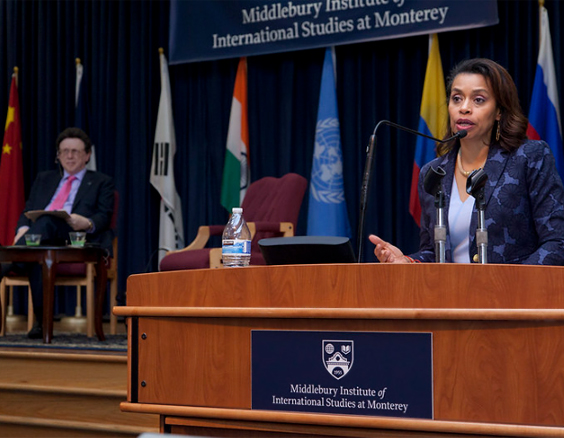June 13, 2022

Ambassador Whyte at MIIS
Ambassador Elayne Whyte Goméz is a Costa Rican diplomat who served as Permanent Representative of Costa Rica to the United Nations in Geneva from 2014-2020. In 2017, she successfully presided over the negotiation of a legally binding instrument to ban nuclear weapons—the Treaty on the Prohibition of Nuclear Weapons (TPNW). During the summer of 2018, Ambassador Whyte returned to her graduate alma mater, the Middlebury Institute of International Studies, to draft her reflections on this process at the James Martin Center for Nonproliferation Studies. While there, she sat down with then-Senior Research Associate and Project Manager Sarah Bidgood to discuss Costa Rica’s selection to chair the negotiation of the Prohibition Treaty, its impact as a multilateral instrument, and its relationship to the NPT, among other topics.
On January 22, 2021, the TPNW entered into force. From June 21-23, 2022, the first Meeting of States Parties will take place in Vienna, Austria. In anticipation of this event, CNS is publishing Ambassador Whyte’s interview with Sarah. The interview has been revised since August 2018 and has been edited for length and clarity.
About the Interviewer
Sarah Bidgood directs the Eurasia Nonproliferation Program at the James Martin Center for Nonproliferation Studies. Her work focuses on US-Soviet and US-Russia cooperation for nonproliferation, arms control, and risk reduction.
Other CNS events and news on the TPNW
- The Treaty on the Prohibition of Nuclear Weapons: What’s Next (January 25, 2021)
- Ambassador Gómez Reflects on Negotiating the Nuclear Weapons Ban Treaty (December 4, 2017)
- The Nuclear Weapons Prohibition Treaty: Negotiations and Beyond (September 5, 2017)
- MIIS Alumna Presides Over Negotiation of Nuclear Weapons Ban Treaty (July 17, 2017)
